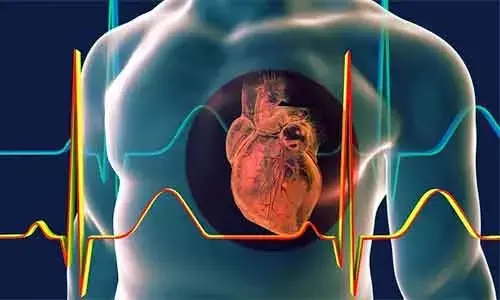- Home
- Medical news & Guidelines
- Anesthesiology
- Cardiology and CTVS
- Critical Care
- Dentistry
- Dermatology
- Diabetes and Endocrinology
- ENT
- Gastroenterology
- Medicine
- Nephrology
- Neurology
- Obstretics-Gynaecology
- Oncology
- Ophthalmology
- Orthopaedics
- Pediatrics-Neonatology
- Psychiatry
- Pulmonology
- Radiology
- Surgery
- Urology
- Laboratory Medicine
- Diet
- Nursing
- Paramedical
- Physiotherapy
- Health news
- Fact Check
- Bone Health Fact Check
- Brain Health Fact Check
- Cancer Related Fact Check
- Child Care Fact Check
- Dental and oral health fact check
- Diabetes and metabolic health fact check
- Diet and Nutrition Fact Check
- Eye and ENT Care Fact Check
- Fitness fact check
- Gut health fact check
- Heart health fact check
- Kidney health fact check
- Medical education fact check
- Men's health fact check
- Respiratory fact check
- Skin and hair care fact check
- Vaccine and Immunization fact check
- Women's health fact check
- AYUSH
- State News
- Andaman and Nicobar Islands
- Andhra Pradesh
- Arunachal Pradesh
- Assam
- Bihar
- Chandigarh
- Chattisgarh
- Dadra and Nagar Haveli
- Daman and Diu
- Delhi
- Goa
- Gujarat
- Haryana
- Himachal Pradesh
- Jammu & Kashmir
- Jharkhand
- Karnataka
- Kerala
- Ladakh
- Lakshadweep
- Madhya Pradesh
- Maharashtra
- Manipur
- Meghalaya
- Mizoram
- Nagaland
- Odisha
- Puducherry
- Punjab
- Rajasthan
- Sikkim
- Tamil Nadu
- Telangana
- Tripura
- Uttar Pradesh
- Uttrakhand
- West Bengal
- Medical Education
- Industry
Intravenous iron reduced rehospitalization risk in people with heart failure

DALLAS - Patients who were hospitalized with acute heart failure and had iron deficiency were less likely to return to the hospital if given intravenous iron replacement, according to late-breaking research presented today at the American Heart Association's Scientific Sessions 2020. The virtual meeting is Friday, November 13 - Tuesday, November 17, 2020. It is a premier global exchange of the latest scientific advancements, research and evidence-based clinical practice updates in cardiovascular science for health care. The manuscript of this study is simultaneously published today in The Lancet.
Study participants were stabilized after an episode of acute heart failure and given intravenous ferric carboxymaltose, an iron replacement therapy, at hospital discharge.
"Iron deficiency is common in patients with heart failure, and it is an independent risk factor for hospital admission and death," said Piotr Ponikowski, M.D., Ph.D., head of the department of heart diseases at Wroclaw Medical University in Wroclaw, Poland, and lead author of the study. "We tested the hypothesis that correcting iron deficiency with ferric carboxymaltose in patients admitted for an episode of acute heart failure and who have iron deficiency is effective in reducing the risk of recurrent hospitalization and cardiovascular death."
The AFFIRM-AHF trial enrolled 1,108 patients in 15 countries who were being discharged after a hospitalization for acute heart failure and found to have iron deficiency during their hospital stay. The participants' average age was 71, and 56% were men, with average heart ejection fraction measures of 33%. Ejection fraction measures the amount of blood pumped out by the heart with each contraction. A normal ejection fraction is between 50% and 70%.
After their heart condition was stabilized, patients received either intravenous ferric carboxymaltose or a placebo during the following 24 weeks, dosed according to the level of iron deficiency.
The analysis found significantly fewer hospital readmissions due to heart failure among the patients treated with intravenous ferric carboxymaltose compared to those who received the placebo. After 52 weeks, patients who received iron supplementation were 26% less likely to be re-admitted to the hospital for heart failure. This result was achieved with only one or two injections in 80% of the patients in the ferric carboxymaltose group.
Results for reduced risk of hospitalization were statistically significant; however, when the researchers looked at the combined goal of reducing hospitalizations and death, the results were not statistically different.
"This is the first study demonstrating the benefits of iron supplementation initiated in stabilized patients hospitalized for acute heart failure, and only two doses were needed in the vast majority of patients," Ponikowski said. "Health care professionals should screen patients with heart failure for the presence of iron deficiency, and intravenous iron should be considered for those with iron deficiency and ejection fraction of 50% or lower."
Hina Zahid Joined Medical Dialogue in 2017 with a passion to work as a Reporter. She coordinates with various national and international journals and association and covers all the stories related to Medical guidelines, Medical Journals, rare medical surgeries as well as all the updates in the medical field. Email: editorial@medicaldialogues.in. Contact no. 011-43720751
Dr Kamal Kant Kohli-MBBS, DTCD- a chest specialist with more than 30 years of practice and a flair for writing clinical articles, Dr Kamal Kant Kohli joined Medical Dialogues as a Chief Editor of Medical News. Besides writing articles, as an editor, he proofreads and verifies all the medical content published on Medical Dialogues including those coming from journals, studies,medical conferences,guidelines etc. Email: drkohli@medicaldialogues.in. Contact no. 011-43720751


